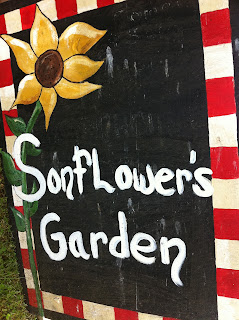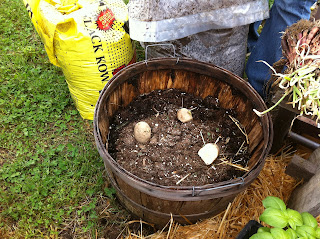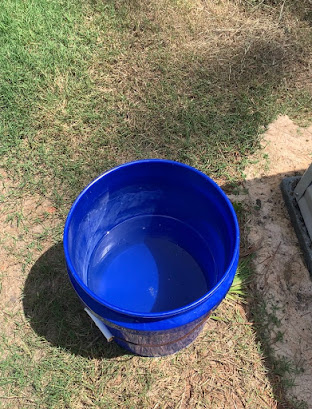Don't Bend Over in the Garden Granny - - Them Taters have "Eyes"!
 |
| SonFlower's Garden with Judy Wright |
I, myself plan to start a garden this Spring and wanted to learn some tips - - Boy, Did I!!??
It seems there are 4 basic Rules for Vegetable Gardening...
1. Choose the Right Soil - Sandy loam is generally the best type of soil to grow crops with; it's the type that crumbles like cake when you fist up a sample in your hand. To achieve maximum results for your vegetables, your garden needs to be tilled to uncover the fresh soil below.
Not all dirt is the same. They vary from place to place. So how do you determine the type of soil you have? Each type is made up of small particles of shell or stone that has broken down over time. It is the size of these particles that determines the type of soil one has.
Clay-Here is Georgia, we are known for our GA Red Clay. Clay soil has the smallest particles in it; because of this when wet, it will stick together. When dried, it will become as hard as a brick. That is the reason it is so good to use for pottery, but not so good for small plants to try and break through or for roots to try and penetrate.
How do you know what to add to your soil in order to make it the "right" soil??
If you want a professional, scientific opinion, the good folks at the University of Georgia can provide soil analysis.
Another way to improve the soil is by adding humus. Humus is the organic matter that is left behind after decomposition of plants and animals. Measure your garden. For each square yard of planting, add 5 gallon buckets of organic matter.
Compost - - Make Your Own! Kitchen scraps, grass clippings, leaves, garden plants and any other waste that will decompose will make great compost material. You can even add cardboard and other paper. (Use a 2:1 ratio of brown material to green material.)
 | ||
| Wooden pallets make a great compost heap |
Manure- Another way to improve the soil is by adding organic fertilizer - - manure. All animals produce it but it is best to use manures that are made up of vegetables. For instance, horses eat grass and hay; chickens eat corn; rabbits eat alfalfa, etc. These are excellent to use in the garden if they are well-rotted. However, it is not wise to use dog, cat, or any other animal that eats meat. This kind of manure is usually full of parasites that would not be good for us and they also smell bad.
2. Allow for proper Sunlight - at least 5 hours of direct sunlight daily.
3. Water your garden properly with a drip system - This discourages fungal growth and allows for maximum irrigation and root growth.
Feed Me! Feed Me! Before you start feeding the soil, you must know what it needs. Again, referring to the soil testing, your soil may be too high or too low in certain nutrients.
 |
| Judy Wright in Action |
What is Soil PH? - The measure of how acidic or alkaline the soil is. The PH scale runs from 1-14 with 7 being neutral. Numbers below seven indicate acidity and numbers above 7 indicate alkalinity. Most vegetables grow best in soil with a PH between 6.0 - 7.0.
Understanding FERTILIZER - Have you ever wondered what all those numbers mean??
They indicate the amounts of each nutrients that are vital to the health of your plant.
- 1st - NITROGEN - Healthy Leaves - Symptoms of too little nitrogen: light green or yellow leaves. CURE: Bonemeal, fish Emulsion and Green Manure.
- 2nd - PHOSPHORUS - Healthy Roots and Good Fruit - Symptoms of low phosphorus: purple green leaves, reddish purple stems, slow growth, poor production. CURE: Rock phosphate.
- 3rd - POTASSIUM - Strong healthy Stems - Symptoms of low potassium: weak and spindly stems, attracts more pest and disease, small thin-skinned fruits with no flavor. CURE: Greensand, granite dust, wood ashes.
How To Read Amounts: Bags are based on 100%
For example: 10-20-10 means: 25% Nitrogen, 50% Phosphorus and 25% Potassium
4. Protect against various Vulnerabilities -
Wildlife - insects, rabbits, mice, deer, etc. are notorious for helping themselves to vegetable gardens.
Rain, drought, wind and so forth can all affect your crops. Be sure to position your garden for good drainage and maximum use of natural wind barriers.
** For more helpful information, contact Boss Brothers or Judy Wright at 770-466-0570
or go to www.southernstates.com
 | |
| SonFlower's Garden |
 | |
| Flower "Bed" |
 |
| Cut Up Potatoes when planting: Their "eyes" will spread! |
 |
| Hint: Plant Marigold Flowers in your "Bed". They keep bugs away! |
 |
| Worm Castings or "Worm Doody" makes great Fertilizer! |
Grab your Farmers Almanac and Get Bloomin' Started!!









Comments
Post a Comment